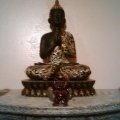Welcome home! Please contact lincoln@icrontic.com if you have any difficulty logging in or using the site. New registrations must be manually approved which may take several days. Can't log in? Try clearing your browser's cookies.
That’s Not It.
I was sitting with several other students and my teacher, most of the weekend visitors to the Gompa had gone home and things were quiet after the hustle and bustle of the retreat that had finished on Sunday evening.
One of the other students started to describe his feeling of detachment from everyday things.
“That’s not it”. said Rinpoche.
After a while another student started to describe blissful feelings that had started the arise in meditation.
“That’s not it either” said Rinpoche.
“It’s not that what you are describing is not real..it’s real in a conventional sense, but it’s not IT.”
“ So what is IT?” Someone asked. “Hard, hard, work with no hope of reward” Rinpoche replied. “ What more do you need?”.
2



Comments
Funny response but work for the good of all is its own reward.
I suspect that Rinpoche would have agreed.🙂 “We must imagine a Buddhist Sisyphus happy” to misquote Camus.
Imagine having the job of trying to lead the compilations of karmic grasping's that makes up the average human onto an arduous path towards suffering's cessation where little more than the goal of goalessness awaits.
What it is:
That’s an answer I might have expected from a renunciate monastic, what more do you need than hard work. It doesn’t really speak to sufferings end or some kind of personal happiness.
Rinpoche was not a renunciate. He was a married man with children.
I am not sure that he saw personal happiness as a thing.
In fact I think he thought that ideas like personal happiness and suffering were mutually dependant.🙂
They are of course, but the relationship is more complex than just ‘less suffering brings you more happiness’ ... there are shadings within both. When you go for a long walk and you get tired, that is a form of suffering but also a form of satisfaction.
The Vajrayana view is that suffering and happiness both arise in great emptiness....shunyata.